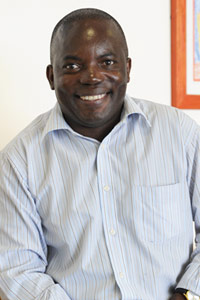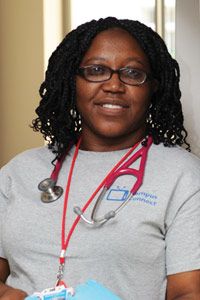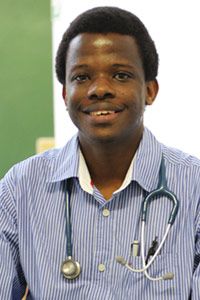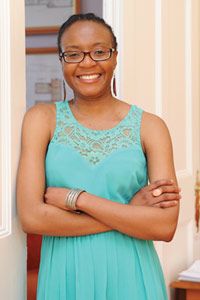Celebrating Africa's health heroes
11 December 2014
Africa is hardest hit by the worldwide shortage of healthcare workers, with only 3% of
the world's healthcare workers tending to 24% of the global disease burden.
To help bridge the skills divide, the University of Cape Town's Faculty of Health Sciences
offers programmes aimed at African students who want to use the expertise to make a
difference in their home countries.
Theresia Shivera-Anton: MMed (Anaesthesiology)
Theresia Shivera-Anton, who is completing a Master of Medicine in Anaesthesiology at
UCT, says she has been "patriotic from a young age".
"When I first came to study medicine my intention was to return home and serve the
Namibian people. Now, as a postgraduate student, that has not changed," she says.
Namibia has only 10 registered anaesthetists, most of whom work in the private sector.
The Namibian Ministry of Health and Social Services' strategic framework outlining plans
to
have 750 medical undergraduates, 100 postgraduates and 22 medical specialists
trained by 2017.
Shivera-Anton has a passion for teaching, and sees herself passing on the knowledge
and skills she's acquired at UCT to the next generation of Namibian medical
professionals.
Upon her return to Namibia, Shivera-Anton plans to initiate a programme for
anaesthetic nurses in every hospital.
George Chagaluka: MPhil (Paediatric Oncology)

A holistic approach to childhood cancer is at the top of things George Chagaluka, a
specialist in paediatric oncology, plans to implement when he returns to Malawi.
Chagaluka, who completed his MPhil in Paediatric Oncology at UCT, believes the
multidisciplinary care he witnessed during his time at the Red Cross War Memorial
Children's
Hospital is something Malawian children could benefit from.
"There is a dire need for good networking among professionals such as surgeons,
pharmacists, radiotherapists and social workers," he says.
According to Chagaluka, Malawi forms part of the belt of African states where Burkitt
lymphoma – childhood cancer associated with malaria, Epstein-Barr virus and HIV – can
be considered endemic.
"Lately, there has been a remarkable increase in the number of cases [of this disease].
The increase has come about for two reasons: more medical graduates have an
improved knowledge of childhood cancer; and the high immunisation coverage has
reduced the burden of infectious diseases, and therefore, diagnostic efforts are
channelled to non-infectious diseases such as cancer. This has led to a growing need for
paediatric oncologists," he says.
Chagaluka is currently the only paediatric oncologist in Malawi, but he hopes to identify
other paediatricians
who can undergo oncology training, as well as set up a "training
programme in Malawi" with others in his field.
Gina Oladokun: MPhil (Paediatric Infectious Disease)

What makes studying at UCT stand out for Gina Oladokun is exposure to the appropriate
identification and diagnosis of conditions related to paediatric infectious disease – about
which she would only have read in textbooks in Nigeria.
Oladokun, a fellow of the African Paediatric Fellowship Programme, is in the process of
completing an MPhil in Paediatric Infectious Disease.
Although paediatric infectious disease is a relatively new sub-speciality in Nigeria, a
Nigerian Society for Paediatric Infectious Disease has been established and is tasked
with streamlining and standardising practice in the
country.
Thabani Thatha: MMed (General Paediatrics)

Zimbabwe has only 30 general paediatricians for a population of more than 13-million
people. Bulawayo has three paediatricians serving about 1-million people – with two of
the three nearing retirement age.
This is what prompted Thabani Thatha to register for an MMed in General Paediatrics at
UCT, where he's now a fellow of the African Paediatrics Fellowship Programme, and
based at the Red Cross War Memorial Children's Hospital.
This is an edited version of a story first published in UCT's Monday Monthly. Read the
full story
here.
 A holistic approach to childhood cancer is at the top of things George Chagaluka, a
specialist in paediatric oncology, plans to implement when he returns to Malawi.
Chagaluka, who completed his MPhil in Paediatric Oncology at UCT, believes the
multidisciplinary care he witnessed during his time at the Red Cross War Memorial
Children's
Hospital is something Malawian children could benefit from.
"There is a dire need for good networking among professionals such as surgeons,
pharmacists, radiotherapists and social workers," he says.
According to Chagaluka, Malawi forms part of the belt of African states where Burkitt
lymphoma – childhood cancer associated with malaria, Epstein-Barr virus and HIV – can
be considered endemic.
"Lately, there has been a remarkable increase in the number of cases [of this disease].
The increase has come about for two reasons: more medical graduates have an
improved knowledge of childhood cancer; and the high immunisation coverage has
reduced the burden of infectious diseases, and therefore, diagnostic efforts are
channelled to non-infectious diseases such as cancer. This has led to a growing need for
paediatric oncologists," he says.
Chagaluka is currently the only paediatric oncologist in Malawi, but he hopes to identify
other paediatricians
who can undergo oncology training, as well as set up a "training
programme in Malawi" with others in his field.
A holistic approach to childhood cancer is at the top of things George Chagaluka, a
specialist in paediatric oncology, plans to implement when he returns to Malawi.
Chagaluka, who completed his MPhil in Paediatric Oncology at UCT, believes the
multidisciplinary care he witnessed during his time at the Red Cross War Memorial
Children's
Hospital is something Malawian children could benefit from.
"There is a dire need for good networking among professionals such as surgeons,
pharmacists, radiotherapists and social workers," he says.
According to Chagaluka, Malawi forms part of the belt of African states where Burkitt
lymphoma – childhood cancer associated with malaria, Epstein-Barr virus and HIV – can
be considered endemic.
"Lately, there has been a remarkable increase in the number of cases [of this disease].
The increase has come about for two reasons: more medical graduates have an
improved knowledge of childhood cancer; and the high immunisation coverage has
reduced the burden of infectious diseases, and therefore, diagnostic efforts are
channelled to non-infectious diseases such as cancer. This has led to a growing need for
paediatric oncologists," he says.
Chagaluka is currently the only paediatric oncologist in Malawi, but he hopes to identify
other paediatricians
who can undergo oncology training, as well as set up a "training
programme in Malawi" with others in his field.
 What makes studying at UCT stand out for Gina Oladokun is exposure to the appropriate
identification and diagnosis of conditions related to paediatric infectious disease – about
which she would only have read in textbooks in Nigeria.
Oladokun, a fellow of the African Paediatric Fellowship Programme, is in the process of
completing an MPhil in Paediatric Infectious Disease.
Although paediatric infectious disease is a relatively new sub-speciality in Nigeria, a
Nigerian Society for Paediatric Infectious Disease has been established and is tasked
with streamlining and standardising practice in the
country.
What makes studying at UCT stand out for Gina Oladokun is exposure to the appropriate
identification and diagnosis of conditions related to paediatric infectious disease – about
which she would only have read in textbooks in Nigeria.
Oladokun, a fellow of the African Paediatric Fellowship Programme, is in the process of
completing an MPhil in Paediatric Infectious Disease.
Although paediatric infectious disease is a relatively new sub-speciality in Nigeria, a
Nigerian Society for Paediatric Infectious Disease has been established and is tasked
with streamlining and standardising practice in the
country.
 Zimbabwe has only 30 general paediatricians for a population of more than 13-million
people. Bulawayo has three paediatricians serving about 1-million people – with two of
the three nearing retirement age.
This is what prompted Thabani Thatha to register for an MMed in General Paediatrics at
UCT, where he's now a fellow of the African Paediatrics Fellowship Programme, and
based at the Red Cross War Memorial Children's Hospital.
This is an edited version of a story first published in UCT's Monday Monthly. Read the
full story
here.
Zimbabwe has only 30 general paediatricians for a population of more than 13-million
people. Bulawayo has three paediatricians serving about 1-million people – with two of
the three nearing retirement age.
This is what prompted Thabani Thatha to register for an MMed in General Paediatrics at
UCT, where he's now a fellow of the African Paediatrics Fellowship Programme, and
based at the Red Cross War Memorial Children's Hospital.
This is an edited version of a story first published in UCT's Monday Monthly. Read the
full story
here.
 Theresia Shivera-Anton, who is completing a Master of Medicine in Anaesthesiology at UCT. (All photos: Michael Hammond, UCT)
Theresia Shivera-Anton, who is completing a Master of Medicine in Anaesthesiology at UCT. (All photos: Michael Hammond, UCT)




